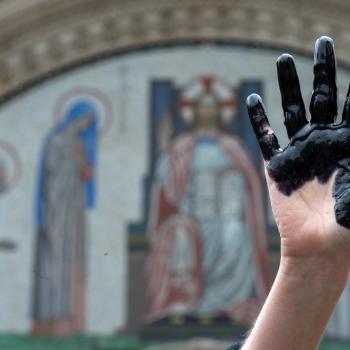
The young Swedish environmentalist, Greta Thunberg, has not only made a name for herself for encouraging environmental activism in the world, she has also made a great number of enemies who like to belittle her in the cruelest of ways possible. They degrade her, not only for her age, but for her gender. It’s not only Greta, other women, like Alexandria Ocasio-Cortez, working hard to help protect the planet from our abuse, not only because of immediate concerns that pollution causes, but because of the wanton destruction of the environment could bring the cataclysmic demise of humanity, who face extreme misogynistic abuse from climate change denialists.
There is, on record, a connection between misogyny and climate change denial. The language used by its critics to demean environmentalists is the language of dominance and control. The same mentality which justifies abuse of the earth is the same mentality which thinks others (women, foreigners, even animals) must be put under control in order to remain in power. As Alice Cherry pointed out, perhaps there is no better current demonstration of this then the actions of Donald Trump:
The correlation between misogyny and anti-environmentalism is perhaps most dramatically illustrated by the current occupant of the White House, who, for all of his supposedly maverick tendencies, displays contempt for both women and the environment in near-perfect patriarchal fashion.[1]
Those who possess money and power claim they possess them by right, but because those rights are challenged, all those who would change their authority must be forced to accept their dominion. The way others are treated, the way they are demeaned, is all a part of the process of self-justification for unjustifiable wrongdoings. It is the same kind of reflection which is used to justify environmental destruction. All kinds of force, all kinds of abuse, is acceptable as a means of holding power. What is at issue is the notion of supremacy and the kind of control mechanism needed to retain it.
Women, children, animals, foreigners, and land, all have been historically seen as existing in some subordinate position to the men in power. For those who want to retain that control, or rather, re-establish it, the desire is to return things to the way they were in the past, using romantic notions of the past as a means to get even those who would otherwise be harmed by such changes to accept what such supremacists promote. This is why “the rule of law” is often the means by which such supremacy is enforced, because, as history shows, this is exactly the way subordination was enforced:
Women, children, and animals have long suffered abuse in the face of the law. Historically, these three groups shared a legal status of significant subordinacy or, worse, of property. The law for centuries reflected common societal perceptions of hierarchy, depriving these groups of rights or significant legal protection, and thus served only to perpetuate and entrench their vulnerability to abuse and maltreatment. [2]
While wanton abuse of subordinates might have been frowned upon by the most benevolent of those in positions of authority and power, the system itself gave less consideration and protection to such subordinates, making abuse not only common, but protected by the law. They were put together, and continue, in the minds of many, to be together, so that when a challenge arises due to gender, race, or environmental concerns, such challenges are ridiculed as being insignificant. The law, so long as it justified such supremacists, was itself claimed to be supreme.
It should not be surprising, therefore, that many in the “alt-right” want to employ the worst examples of history as the way things should be in the future. Abuse of others is normative for them because it is through such abuse they demonstrate their supposed superiority. Anyone who is concerned about human rights and the obligations which come from them are seen as an extreme challenge to the system which they believe is God-given. Indeed, religion is a tool for them, as they use it to justify a hierarchy in which they come out on top. Bad arguments and ideas from the past are brought back and used once again. When a particular religious figure, who might otherwise be holy, made some bad argument, that argument is promoted, turning what might have been a poor opinion from the past into a terrible ideology in the present. They can find ways to undermine all those who are considered “other” than themselves and those who they think represent the “best of humanity” (which is often white males). As Stephen Webb explained, the way “human nature” was described in the past can be and is often useful for such supremacists as they find ways to subordinate and dominate others:
Indeed, theories of human nature, propounded by men, are anxious to distinguish and separate the human from the animal. These very qualities also have been used by men to separate men from women. Like animals, women have been deprived of basic rights because of supposed biological differences from the ideal animal, the male human being. The connection between women and animals are more than symbolic. Women are thought to be closer to animals, in part because they maintain animal functions (reproduction and child rearing). Female skills are assigned to the instinctual and thus do not deserve proportionate rewards. Women are frequently allocated jobs that are dehumanizing in their routine and status. For example, most of the approximately 54,000 nonunionized North American meatpacker workers are Hispanic or African American women with a high school education or less. This job is considered one of the most dangerous in the United States. The most opposed segment of the population is chosen to carry out the destruction that consumers do not want to face. Our domination of animals is mediated so that we can obtain immediate gratification without any hesitation or guilt.[3]
Any attempt to return to a so-called Golden Age in the past is merely a reconstruction of the past which misses ignores much of the past itself, including and especially, the checks and balances which led social revolution and changed things for the better. In this way, the reconstruction of the past as an ideology in the present makes for things to be worse than they were in the past. Such ideology often sheds itself of the benevolence needed to overcome the shortcomings of any particular system.
Christians, when witnessing any malevolent force trying to overturn the advances promoted by social justice, must resist it following the teachings of the Christians faith. They must love others, just as they must recognize that in Christ Jesus there is no “other” gender or race, so that when they see the old social order has been transcended, they recognize such transcendence as being in accord with the teachings of Christ. Likewise, Christians must recognize, contrary to all notions of supremacy, we must act in self-giving love which seeks to raise others up instead of stomping on them and pushing them down. While it is often said patriarchy is the source of these problems (because patriarchy is the way in which such notions of human nature were introduced), we must be careful and not replace it with another faulty system of subordination and domination which allows for and will bring back the same terrible ways (just under a new ideological perspective): patriarchy is not the only issue, but only a representation of the greater issue, of the natural tendency to form destructive systems of abuse and structures of sin to reinforce such abuse. This is not to deny the faults of patriarchy must not be acknowledged, because they must be; it is an important representation of where we have come from, the most immediate context in which supremacy has arisen, and what we see many continue to desire (as can be seen in the way “toxic masculinity” not only exists, but is causing wanton destruction around us today).[4]
This, then, is what confronts us today. We are living in a time in which the environment risks being destroyed, and with it, humanity as a whole. We risk destroying our own home, the planet Earth. Those who understand this, even if they are imperfect, often receive the blunt end of toxic masculinity with its attempt to deride others in the way it knows how to do so: this is why they often “feminize” the opposition and then treat all such “feminine” as objects to be controlled and dominated (for they think such feminization represents inferiority). The Earth, itself, is feminized as a part of their fetish, allowing them to justify their “rape” of the Earth.
Paul, who sometimes is used by those possessed by the spirit of toxic masculinity and its common associates in the right, nonetheless fundamentally undermines their position in the way he reorganized all people under Christ (cf. Gal. 3:28). Women, like St. Thecla, could be co-workers (and not subordinates) with him in the spread of the Gospel. They were to be treated with respect and helped, as he wrote to the Philippians:
I entreat Euodia and I entreat Syntyche to agree in the Lord. And I ask you also, true yokefellow, help these women, for they have labored side by side with me in the gospel together with Clement and the rest of my fellow workers, whose names are in the book of life (Phil. 4:2-3 RSV).
And, of course, it is not just women, Paul understood all things were being elevated by Christ, so that it was once subjugated and dominated and abused, but with the coming of the children of God, it is to be elevated and its subjugation overturned:
I consider that the sufferings of this present time are not worth comparing with the glory that is to be revealed to us. For the creation waits with eager longing for the revealing of the sons of God; for the creation was subjected to futility, not of its own will but by the will of him who subjected it in hope; because the creation itself will be set free from its bondage to decay and obtain the glorious liberty of the children of God (Rom. 8:18-21 RSV).
The Christian message from the beginning has always been against the claims of subjugation and abuse. This is why God is always shown throughout Scripture as a God promoting the rights and needs of the oppressed. Jesus said that the rich are to fear the consequences of their avarice while the poor will see themselves raised up to the kingdom of God. Any attempt to return to a system of pure domination and control, especially once which seeks to undermine the dignity of the earth, or any creature of the Earth, is a return to the system of sin which Christ came to override. It is not Christian (even if so-called Christians promote it). And, following the prophetic way God called for his followers to help all those who are unjustly mistreated and abused, especially when they are following, like Greta Thunberg, the justice which God expects Christians to act in support of all the abused in the world today. When someone is seen to be undermined for their support of justice, the Christian response must be to lift them up and work with them, hoping beyond hope, to help mediate God’s saving grace to the world at large.
[1] Alice Cherry, “Invisible Climate Wars, Part I: Climate Destruction as Gender Violence” in Climate Defense Project (May 2, 2017).
[2] Vivek Upadhya, “The Abuse of Animals as a Method of Domestic Violence: The Need for Criminalization,” in Emory Law Journal vol. 63. No. 5 (2014): 1165.
[3] Stephen W. Webb, On God and Dogs (Oxford: Oxford University Press, 1998), 55.
[4] “But this scramble for dominance and denial of emotion comes at great cost. It blunts men’s awareness of other people’s needs and emotions, drives domestic and sexual violence, makes aggression look like a reasonable way to solve conflict, forbids seeking health care (and even thinking about seeking mental health care), and pours fuel on the fire of drug and alcohol abuse,” Ellen Hendricksen, “How To Fight Toxic Masculinity” in Scientific American ( Jul. 26, 2019).
Stay in touch! Like A Little Bit of Nothing on Facebook.
If you liked what you read, please consider sharing it with your friends and family!













